A brief history of the Cricket World Cup – By Simon Burnton
Source: The Guardian
From its humble beginning in 1966, the tournament’s history is filled with English despair and southern hemisphere triumph
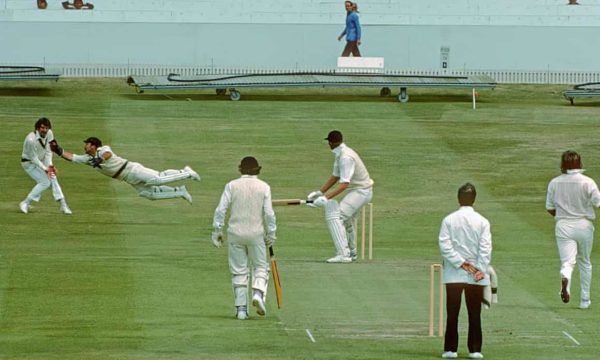
Rod Marsh dives in front of first slip to dismiss Tony Greig during the World Cup match between Australian and England at Headingley in 1975. Photograph: Patrick Eagar via Getty Images
1966
In March 1966 Rothman’s and the influential agent Bagenal Harvey announce that a three-game “World Cup” will be held in September, to be contested by England, West Indies – that summer’s tourists – and an all-star Rest of the World XI to be led by the Australia captain, Bobby Simpson, with the remainder of the team chosen – obviously – by readers of the Radio Times. Sadly England’s capacity for World Cup fever is exhausted by the football version, and the three matches attract a combined audience of 13,000 to Lord’s. Having not been organised by the International Cricket Council and with teams arbitrarily selected according to convenience and sponsorial whim, this World Cup does not count towards official records. It is the only one England have won.
1969
Ben Brocklehurst, the former Somerset captain then working for the publisher of the Cricketer magazine, suggests to MCC that a World Cup might be a nice money-spinner. MCC is so enthused by the idea that it immediately spends several years pushing it around various committees.
1971
The ICC discusses the proposal for the first time, and immediately springs into action – cricket administration-style. “The delegates felt it was a good idea,” reports the Guardian. “They will report back to their boards at home and submit ideas for collation by a small sub-committee which is being set up.” The Observer’s Tony Pawson, a vocal World Cup supporter, looks forward to “more years being happily frittered away discussing whether Fiji and Holland should be included and if so how the competition can be organised and financed …. What a pity that the ICC should approach the opportunity as if it was still playing in a timeless Test!”
1973
The first women’s World Cup is held in England, organised by the players themselves and bankrolled by the former Wolves chairman Sir Jack Hayward. While it is on the ICC finally endorses the idea of a men’s competition and schedules the first one for 1975.
1975
Hosts England Winners West Indies
The first World Cup is, in the words of the Guardian’s Henry Blofeld, “a greater success than anyone could have dared hope”, even if England were bowled out for 93 and easily eliminated by Australia in the semi-finals. The only complaint is that only £20,000 trickles down to the counties, leading to accusations that tickets were too cheap, at £1 for group-stage matches and rising to £3 (about £25 in today’s money) for the final. “I would have thought, on reflection, that some of the games were underpriced,” the ICC’s Peter Lush admits. “Cricket from bitter experience of idle turnstiles was scared of pricing itself out of the market in what was, after all, a pilot scheme,” writes Christopher Ford in the Guardian. “Next time it may be different.” Adult tickets for this year’s final range from £95 to £395.
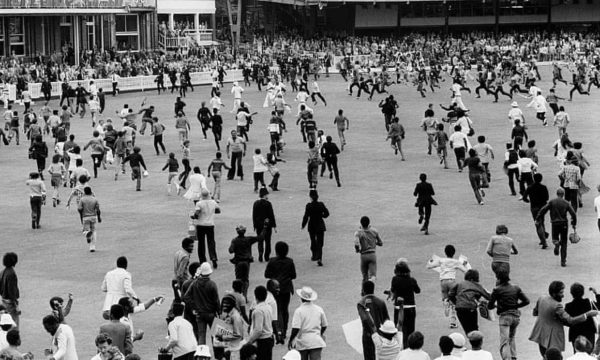
![]() West Indies fans rush on to the ground after West Indies beat England by 92 runs in the World Cup final at Lord’s in June 1979. Photograph: Graham Turner/The Guardian
West Indies fans rush on to the ground after West Indies beat England by 92 runs in the World Cup final at Lord’s in June 1979. Photograph: Graham Turner/The Guardian
1979
Hosts England Winners West Indies
After a pre-final snafu concerning the allocation of tickets to players – they were initially given two each, which rose to three after protests from both captains – “It seemed a bit much when a player had to choose between leaving at home one of his parents or his wife,” says Mike Brearley – the overwhelming favourites, West Indies, smash England at Lord’s. Viv Richards and Collis King put on “a batting display almost beyond the scope of our British imagination”, according to the Guardian’s Scyld Berry. King, coming in at 99 for four, strikes 86 off 66 balls – in terms of strike rate the fourth most brutal innings in ODI history at the time – and Richards a comparatively pedestrian 138 off 157. England’s response starts with Brearley and Boycott putting on 129 for the first wicket, the bad news being that it takes a shade over 37 overs to do it. “The partnership was splendid of its kind – the highly competent, English five-day Test‑match kind,” writes Berry. By the time they depart the target is out of reach, and England make absolutely sure of defeat by losing their last eight wickets for 12 runs in 25 balls.
1983
Hosts England Winners India
This tournament features the first genuine World Cup giant-killing, as the debutants Zimbabwe beat Australia in their opening game. India come into the tournament as 40-1 outsiders having only won one match in their first two World Cups (and that against the combined East Africa team who were thrashed by all of their opponents in 1975), play West Indies – who have a 100% World Cup record – in their opening match, win, and then keep winning. When they beat England to set up a second meeting with West Indies in the final, Matthew Engel is so convinced of their inferiority that he writes in the Guardian that “the prime hope must be that the competitors do not turn out to be too mismatched to provide a suitable climax to this magnificently successful event”. India win a slow-scoring final by 43 runs. Digesting this upset, Engel is unrepentant. “If the same personnel could be reassembled in the same circumstances another 50 times, India probably would not win again,” he insists. “It is a bit like the infinite number of monkeys at an infinite number of typewriters eventually writing Hamlet. And there were an infinite number of typewriter-types feeling like monkeys on Saturday.”
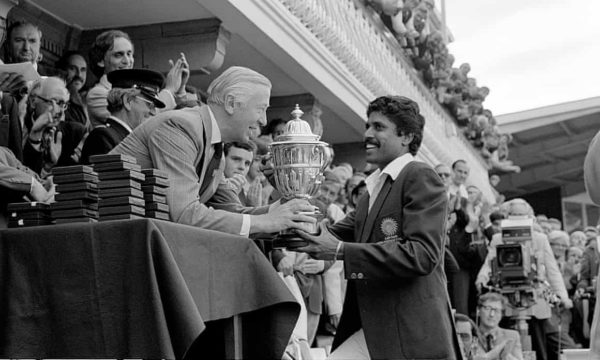
![]() Kapil Dev receives the World Cup after India’s triumph at Lord’s in 1983, having come into the tournament as 40-1 outsiders. Photograph: Patrick Eagar/Patrick Eagar via Getty Images
Kapil Dev receives the World Cup after India’s triumph at Lord’s in 1983, having come into the tournament as 40-1 outsiders. Photograph: Patrick Eagar/Patrick Eagar via Getty Images
1987
Hosts India/Pakistan Winners Australia
For the first time the tournament is played outside England, while innings are reduced in length by 10 overs to a maximum of 50. “Everybody in our side believes that we are expert enough to win this World Cup,” insists the England manager, Mickey Stewart, before the tournament, and they get close, losing against Australia in the final by the wafer-thin margin of seven runs. Mike Gatting is blamed by many after getting out reverse-sweeping Allan Border’s first delivery. “I was trying to exploit large gaps on the off side,” he says. “Ultimately it was like every other dismissal – any shot which gets you out is a crap shot.”
1992
Hosts Australia/New Zealand Winners Pakistan
England reach their third and, to date, last final, at the end of a tournament featuring the first appearance of such novelties as coloured kits, white balls and South Africa – eventually beaten by the English in a ludicrous, rain-affected semi-final which concludes with an achievable pre-downpour target of 22 runs in 13 balls being amended to 21 off just one. The hosts flop badly, Australia dumped out in the round-robin stage. Pakistan win only one of their first five games but crucially win all of their last five to snaffle the trophy, roused by an infamously inspiring address by Imran Khan about cornered tigers, based largely on a picture of a tiger that happened to be on his T-shirt that day. “All I know is that after those 15 minutes, I haven’t had that feeling ever before and I never had it again after,” says Aaqib Javed. “I could feel that nobody could face me or stop me. In those 15 minutes, life changed.”
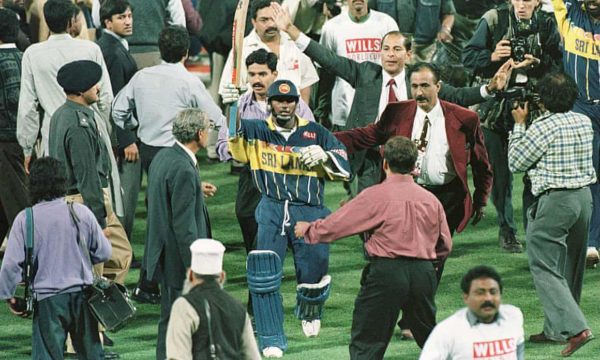
![]() Aravinda De Silva raises his bat in triumph as he leaves the field after leading Sri Lanka to victory in the 1996 World Cup final against Australia in Lahore. Photograph: John Parkin/Getty Images
Aravinda De Silva raises his bat in triumph as he leaves the field after leading Sri Lanka to victory in the 1996 World Cup final against Australia in Lahore. Photograph: John Parkin/Getty Images
1996
Hosts Pakistan/India/Sri Lanka Winners Sri Lanka
Sri Lanka qualify for the quarter-finals before a game is played, when Australia and West Indies refused to travel there citing security concerns, thus handing the co-hosts a pair of walkovers – and go on to win the entire tournament, becoming the first team to win a World Cup final batting second. That the beaten finalists were Australia, one of the reluctant travellers, only added to Sri Lanka’s satisfaction. They reach that stage in unusual circumstances, awarded victory over India by the match referee after frustrated home fans in Calcutta force the players off the field under a shower of bottles and assorted debris.
1999
Hosts England/Wales Winners Australia
A tournament primarily remembered for the remarkable progress through the latter stages of Australia. Victory against South Africa in the final match of the Super Six stage – featuring Steve Waugh’s now legendary if disappointingly apocryphal put-down to Herschelle Gibbs, “You just dropped the World Cup” – means the Australians qualify to play the same opponents in the semi-finals, a match of constantly shifting fortunes widely considered the greatest ODI of all time. “On the boundary I remember thinking, ‘We’re going to win this. No, we’re going to lose this. No, we’re going to win this.’ Every over,” says Michael Bevan. In fact they draw it, Australia go through to the final because they finished above their rivals in the Super Sixes, and they proceed to thrash Pakistan to win their second World Cup.
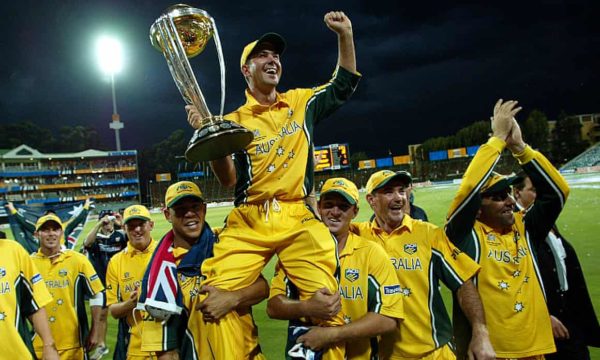
![]() Ricky Ponting is carried on the shoulders of his teammates with the World Cup after their victory against India in the 2003 final in Johannesburg. Photograph: Jon Hrusa/AP
Ricky Ponting is carried on the shoulders of his teammates with the World Cup after their victory against India in the 2003 final in Johannesburg. Photograph: Jon Hrusa/AP
2003
Hosts South Africa Winners Australia
Another World Cup, another unusual elimination for South Africa, this time the hosts. As rain falls during their last game of the pool stages they get their Duckworth-Lewis calculations wrong, make no attempt to score a run from what becomes the final ball of the match and so secure only a tie. Thus they, like England, Pakistan and West Indies, fall at the first hurdle while Zimbabwe (thanks to a walkover when England refuse to play in Harare) and Kenya (thanks to New Zealand’s refusal to play in Nairobi) progress – the latter going all the way to the semi-finals. Australia retain their trophy after beating India with great ease in the final, ending in glory a tournament that had begun in ignominy as Shane Warne was sent home after failing a routine drug test. Warne insists it was “a fluid tablet” intended “to get rid of a double chin”; a disciplinary committee declares his evidence “unsatisfactory” and bans him for a year.
2007
Hosts West Indies Winners Australia
Australia win again, their third tournament in a row. But much attention is diverted from the cricket by the death of the Pakistan coach Bob Woolmer, whose body is found in his hotel room the day after their elimination in the group stage at the hands of Ireland. More frivolously Andrew Flintoff engages in some infamous drunken pedalo-borrowing, after deciding at about 1.30am one morning to check some boats moored offshore to see if any of them contain Ian Botham. “I thought, ‘I’m going to have a nightcap with Beefy,’” he explains. It is not the most farcical activity undertaken after sunset by a cricketer: the final three overs of a final already basically won are inexplicably played out in virtual darkness in a move described by the ICC chief executive, Malcolm Speed, as “a fundamental error which should not have happened”.
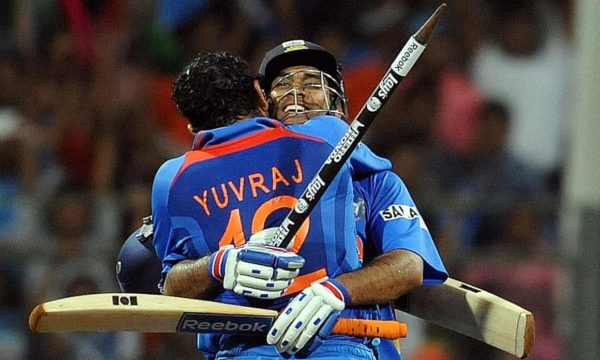
![]() Yuvraj Singh and MS Dhoni celebrate their victory in the 2011 World Cup final between India and Sri Lanka in Mumbai. Photograph: Prakash Singh/AFP/Getty Images
Yuvraj Singh and MS Dhoni celebrate their victory in the 2011 World Cup final between India and Sri Lanka in Mumbai. Photograph: Prakash Singh/AFP/Getty Images
2011
Hosts India/Sri Lanka/Bangladesh Winners India
On 19 March 2011 Australia lose a World Cup match to Pakistan, ending an unbeaten run that goes back 34 games and 12 years. Instead Sri Lanka reach their third final in five tournaments and India become the first team to win a home World Cup – their support in Mumbai for the final is so vociferous that the coin toss has to be retaken because the match referee could not hear Kumar Sangakkara’s call the first time round. Elsewhere history is made by Kevin O’Brien, who scores the fastest century in World Cup history, off a mere 50 deliveries, as Ireland thrillingly beat England in the group stage. In the second instalment of England’s solo attempt to render the group stage interesting they lose against Bangladesh in Chittagong, sparking scenes of wild celebration outside the ground that continue so long that it is 2.30am by the time England are able to leave their dressing room.
2015
Hosts Australia/New Zealand Winners Australia
“We would have to have an absolute stinker not to make the quarter-finals,” says Stuart Broad before the tournament begins. England do not make the quarter-finals, demonstrating a profound misunderstanding of what a modern limited-overs team should look and indeed play like. The southern hemisphere provides the three outstanding teams, with New Zealand beating South Africa in a thrilling semi-final – “One of the most extraordinary, intoxicating sporting events I have ever attended,” writes Mike Selvey – thanks to a penultimate-ball six, with five needed to win, from the Johannesburg-born Grant Elliott. But they have no answer to a Mitchell-based Starc/Johnson pace attack in the final, as for the fourth time in five the trophy ends up in Australian hands.








No Comments